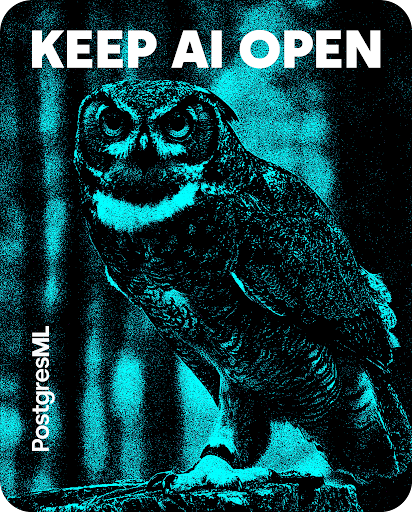What’s Hacker News’ problem with open source AI – PostgresML

🌈 Abstract
The article discusses the importance of open-source AI and the benefits of adopting a complete open-source stack for AI-driven applications. It highlights the limitations of proprietary AI models and the advantages of transparency, flexibility, cost-efficiency, and community collaboration offered by open-source solutions.
🙋 Q&A
[01] Open-source AI
1. What are the key benefits of open-source AI mentioned in the article?
- Transparency and trust: Open-source projects provide transparency into how data is processed, models are trained, and decisions are made, building trust with users and stakeholders.
- Flexibility and customization: Open-source tools offer the freedom to customize every aspect of the stack to fit unique needs, leading to more innovative solutions.
- Cost efficiency: Open-source stacks eliminate recurring licensing fees and usage costs associated with proprietary solutions, providing a more sustainable and scalable approach.
- Community and collaboration: The open-source community enables access to a vast pool of knowledge, resources, and support, accelerating development through collaboration.
2. How does the article characterize the debate around the "open-source" nature of Meta's Llama models? The article suggests that the debate on Hacker News about whether Llama models are truly "open-source" misses the broader importance of open-source AI. It argues that open-source AI is not just about licenses and definitions, but about the power and incentive structures that shape the technology's development and impact on society.
3. What is the author's perspective on the roles of Mark Zuckerberg and Sam Altman in the open-source AI landscape? The article suggests that the author does not view either Zuckerberg or Altman as a clear villain or hero in the open-source AI story. It states that they are both CEOs of powerful companies trying to shape the technology, and that the author trusts Zuckerberg to look after Meta's interests, while being less trusting of Altman to look after all of humanity's interests.
[02] The Power of Open-source AI Stacks
1. What are the key elements of a complete open-source AI stack according to the article? The article mentions that a complete open-source AI stack encompasses data preprocessing, model deployment, scaling, and monitoring. It's the combination of these elements that allows for the creation of innovative, robust, and efficient AI-driven applications.
2. How does the article describe the benefits of a fully open-source AI stack? The article outlines the following key benefits of a fully open-source AI stack:
- Transparency and trust: Open-source components allow for a better understanding of how the system operates, building trust with users and stakeholders.
- Flexibility and customization: Open-source tools offer the freedom to customize every aspect of the stack to fit unique needs.
- Cost efficiency: Open-source stacks eliminate recurring licensing fees and usage costs associated with proprietary solutions.
- Community and collaboration: The open-source community provides access to a vast pool of knowledge, resources, and support, accelerating development.
3. What are the main pitfalls of proprietary AI models according to the article? The article highlights the following drawbacks of proprietary AI models:
- Lack of transparency: Proprietary models are "black boxes," making it impossible to fully understand how they operate, leading to potential trust issues.
- Vendor lock-in: Reliance on proprietary solutions can lead to vendor lock-in, stifling innovation and limiting the ability to adapt to new technologies.
- Ethical and legal concerns: The lack of visibility into how proprietary models are trained and designed can raise ethical and legal concerns, particularly regarding data privacy and usage rights.
[03] PostgresML: An Open-source AI Solution
1. What is PostgresML, and what are its key advantages according to the article? PostgresML is an end-to-end machine learning and AI platform that integrates machine learning capabilities directly into PostgreSQL. The article highlights the following key advantages of PostgresML:
- Integrated Environment: PostgresML eliminates the need for complex data pipelines by integrating ML directly into the database, reducing latency and improving performance.
- Scalability: Leveraging PostgreSQL's robust architecture, PostgresML can scale with your data and models, providing enterprise-level performance and reliability.
- Community and Ecosystem: PostgresML benefits from the extensive PostgreSQL community and ecosystem, ensuring continuous improvement and support.
2. How does the article describe the future of open-source AI? The article states that open-source AI is a "healthy reversion to the industry norm" and that by embracing open-source tools and platforms, we gain transparency, control, cost efficiency, and foster a collaborative environment that drives innovation. The article suggests that as the AI landscape continues to evolve, the benefits of open-source will become even more pronounced, solidifying its role as the backbone of modern application development.